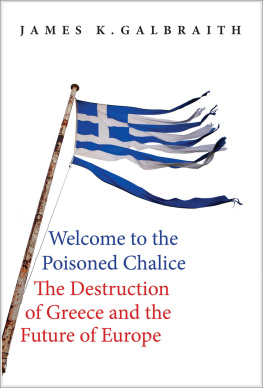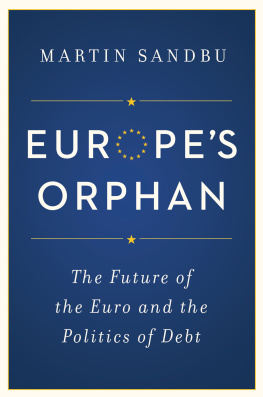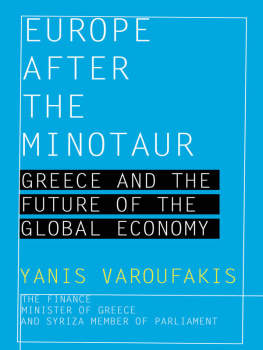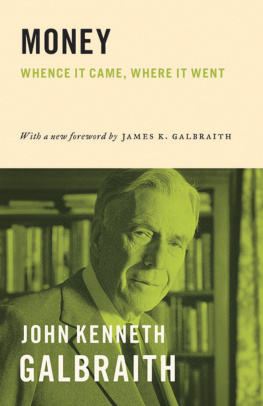Welcome to the Poisoned Chalice
Welcome to the Poisoned Chalice
The Destruction of Greece and the Future of Europe
JAMES K. GALBRAITH

Copyright 2016 by James K. Galbraith.
All rights reserved.
This book may not be reproduced, in whole or in part, including illustrations, in any form (beyond that copying permitted by Sections 107 and 108 of the U.S. Copyright Law and except by reviewers for the public press), without written permission from the publishers.
Yale University Press books may be purchased in quantity for educational,
business, or promotional use. For information, please e-mail
(U.K. office).
Set in Janson type by Integrated Publishing Solutions,
Grand Rapids, Michigan.
Printed in the United States of America.
Library of Congress Control Number: 2015955723
ISBN 978-0-300-22044-5 (cloth : alk. paper)
A catalogue record for this book is available from the British Library.
This paper meets the requirements of ANSI/NISO Z39.48-1992
(Permanence of Paper).
10 9 8 7 6 5 4 3 2 1
For Yanis and Danae
The bankruptcy and decay of Europe, if we allow it to proceed, will affect everyone in the long run.
J OHN M AYNARD K EYNES , 1919
Contents
Welcome to the Poisoned Chalice
ONE
Welcome to the Poisoned Chalice
The modern Greek drama has its origins in the brutal German occupation of 19401944, in the British abandonment and betrayal of the Partisans that followed, in the ensuing civil wars, in the CIA-backed colonels coup of 1967 and the dictatorship that followed, in the restoration of democracy in 1974, and in the introduction of a modern welfare state under Andreas Papandreou in the 1980s. It has origins in the turn to Europe engineered for Greece by Constantine Karamanlis and continued by Papandreou, in the ensuing corrupt waves of bank-financed military procurement and construction contracts, in the financial chicanery that covered Greeces ineligibility to join the Eurozone, and in the wave of borrowing, investment, construction, and debt-fueled growth that followed the introduction of the common currency in 1999. It was, from one point of view, an accident waiting to happen.
Yet if this were the whole story, it would be necessary to tell another one, equally good, for Spain, whose civil war came a decade earlier, for Ireland, whose civil war was a decade before that, and for Portugal, which never had a civil war. It would be necessary to explain why each of these countries fell into crisis at the same time and why others with equally fractured pasts and no stronger claim to business virtueFrance, for instance, or Germanydid not. Most of all, these explanations would leave open a central question: Why did the crisis hit the peripheral countries of the euro and not so much those, such as Poland or Croatia, which had retained their national money?
In 1919, John Maynard Keynes wrote: Europe is solid with herself. France, Germany, Italy, Austria and Holland, Russia and Roumania and Poland, throb together, and their structure and civilization are essentially one. This was of course untrue for the first seventy years after those words appeared, as Europe was rent by depression and autarky, and then by war and finally by the Iron Curtain, a division that most of us raised in the 1950s and 1960s, especially in America, were brought up not to expect to end. But it did end, in 1989, and then Germany reconstituted itself as the economic power at the core of Europe and the heart of the common currency, a hard money modeled on the gold standard and the Deutschemark.
There followed a remarkable development, perfectly understandable in retrospect but not widely foreseen when it mattered. Without a currency that could appreciate against those of her trading partners, German productivity increased and its technical excellence produced a declining real cost of exports, while in its European trading partners, deprived of currencies that could depreciate, stable purchasing power and easy credit produced a corresponding increase in demand for German goods. Meanwhile, Germany held down its internal wage levels while other countries allowed wages and unit labor costs to rise. The flow of goods from Germany to its markets was matched by a flow of credit, either directly to state purchasers of arms and infrastructure, as in Greece,
If this helps us to see why Europe and the Eurozone plunged into crisis, it still does not explain why it all began to happen more or less at once, in 2010. The reason lies in the financial crisis of 20072009, which was a world crisis emanating from the United States. That crisis had its own origins, in a complex history of deregulation and desupervision going back four decades, culminating in the corruption and destruction of the vast US mortgage market under a series of presidents from Reagan through George W. Bush. Europeans became embroiled in this calamity in two ways: as the purchasers of US mortgage-backed securities and via parallel processes of internal deregulation and desupervision, in the context of historically close relations between banking elites and European states. So when the world financial crisis hit, it was no surprise that European banks would dump riskin the form of peripheral country debts whether public or privateand turn to their national governments for help. Nor was it any surprise that the governments placed rescue of their own banks far above any concern for the consequences in Greece. In this third way, the Greek drama is only an artifact, a side effect of the global banking and financial disaster.
From 2010 forward, these large forces intermingled and acted out on a small stage. The Hellenic Republic, a nation of islands and peninsulas on a distant edge of Europe, has just 3 percent of Europes population and less than 2 percent of its gross output. It was (and still is) a stage of extreme effects. Greece had the largest deficits in precrisis Europe, well above 10 percent of GDP; it was forced to by far the greatest adjustment, moving to surplus within just a few years, mainly by cutting public spending, employment, and pensions, with more than 300,000 civil servants laid off. Greece accordingly suffered the largest economic and social collapse, losing more than 25 percent of its income; it labors still after five years under the largest external debts in relation to its GDP, and the highest rate of unemployment. The stress of daily life in Greece since 2010 has been enormous, and the country has been marked by rising rates of homelessness, emigration, and suicidethe social and psychological markers of economic failure.
My family engagement with Greece goes back seven decades. It is likely that my father first met Andreas Papandreou in the 1940s, and they were economist-colleagues at Harvard and Berkeley, respectively, in the 1950s. In April 1967, my fathers intervention with Lyndon Johnson saved Andreas from execution at the hands of the colonels. (The message was relayed by phone at two oclock in the morning: Call Ken Galbraith, and tell him Ive told those Greek bastards to lay off that son-of-a-bitch, whoever he is.) My first return to Greece since childhood was not until 2006, to speak at an event honoring Andreas ten years after his death. In a cathedral-like setting, to a large and somber crowd of political and academic figures, including the entire Papandreou family, I read out that punch line.
When George Papandreou became prime minister in October 2009, I responded to an invitation to visit, advise, and (mostly) lend moral support. My role over several visits was insubstantial. Papandreou had run on a social welfare and economic growth platform that was swiftly overturned by the financial and debt crisis. By May 2010 he was forced to accept an austerity program as the price of a massive loan to avert the collapse of the Greek banking system, which was deeply invested in the unpayable debts of the Greek state. With that loan, power over economic policy passed to a committee of creditor institutionsthe European Commission, the European Central Bank, and the International Monetary Fundthe infamous troika. Austerity, in turn, was supposed to make it more probable that the Greek state would be able to service its new and old debts.
Next page










